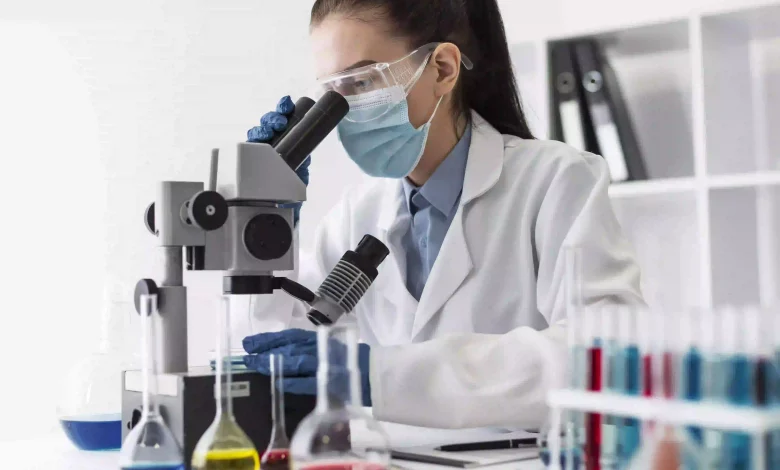How Are Lab Benches Protected from Chemical Reactions?

Labs are exposed to chemicals and harsh liquids that can damage benches, countertops, and other surfaces. If you spill acid or chemicals on a lab bench, follow the recommended cleaning procedure.
Wear a new pair of gloves and wipe the spill with a paper roll. Make sure you dump the paper roll and gloves in a hazardous waste bin. You may also need to apply a neutralizer to prevent the spill from damaging the surface it was spilled on.
6 Ways to Protect Your Lab Bench from Chemical Reactions
Leading labs take proactive measures to protect the benches and countertops from potential spillage. Some top solutions include using premium bench covers, establishing preventive measures, and following the right cleanup protocol.
You should also consider purchasing custom benches built to withstand standard chemicals used in your laboratory. Here are several ways to protect your lab surfaces and benches from chemical reactions:
1. Use Protective Sheets
Protective sheets or coverings offer a simple way to protect your benches and countertops from harsh chemicals. Some protective rolls absorb the spillage and prevent it from penetrating the countertop. You can use them to cover your workbenches, tables, and countertops. The sheets offer the first line of protection and are easy to apply and remove. You only need to install new sheets and remove them if a spill occurs.
2. Use Quality Benches
Premium custom laboratory benches are designed with your lab in mind. The surfaces will feature top-quality materials capable of absorbing or suspending the chemical without a reaction. You can find benches with epoxy or phenolic resin countertops. Other benches use stainless steel. Stick to premium quality materials and reputable suppliers that provide durable, resilient, and chemical-resistant surfaces.
3. Clean Spills Immediately
Have a cleaning protocol to prevent spills from damaging your benches and surfaces. If the spill is acid on a wooden bench, sodium bicarbonate may help neutralize the effects for the least damage. Dilute acid may also work for acidic spills. Make sure you clean the liquid or chemical mixture immediately before applying neutralizing agents. The chemical will cause more damage the longer it remains on the surface.
4. Establish Preventative Measures
You can protect your lab benches from chemical reactions by preventing spillage and chemical contact. Preventative measures include optimizing the lab for easy access and movement. You should also avoid clogging the benches and countertops with too much equipment. The benches should be spaced for efficiency to reduce the likelihood of bumps and accidents. You can also lay down paper rolls below the beakers and containers.
5. Follow Proper Maintenance
The cleaning and maintenance routines may influence how laboratory benches react to chemical spillage. If the benches are covered in dust, oils, grime, and other dirt, the particles may react to certain chemicals. Keep the benches clean at all times. Follow the right cleaning procedure and keep the benches in good shape. Old benches have more spaces for chemicals to seep through and cause a reaction, so maintain new, functional equipment.
6. Follow Manufacturer Recommendations
Laboratory bench manufacturers know what their products can withstand. You should follow all recommendations that come with the bench. The manufacturer may demand specific cleaning procedures and protective materials. Look for the list of chemicals you should prevent from coming into contact with your benches. Stick to recommended cleaning agents and avoid making scratches or dragging heavy tools on the bench.
Premium Quality Lab Benches and Tables
You need the best quality lab bench for the most resilience against hazardous chemicals and spills. Quality benches are customized to your needs and feature premium materials and construction. The best benches can resist various spills and chemicals, but you still need proactive measures and fast solutions. Keep an efficient workflow and identify the best solutions to prevent chemical reactions.






